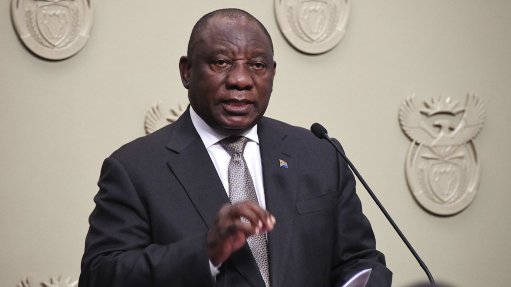
President Cyril Ramaphosa
President Cyril Ramaphosa said on Monday that while the defence force is the only lawful military force in the country, the responsibility to defend the country’s democracy and uphold its Constitution rests with each individual.
He added that the country’s democratic Constitution is the product of years of sacrifice and struggle with many South Africans having endured pain and hardship, and many losing their lives, to ensure a democratic society with equal rights.
“We should therefore be concerned when those who occupy prominent positions in society make statements that demonstrate a disdain for the basic principles of our Constitution and the institutions established to defend our democracy,” said Ramaphosa.
As Commander-In-Chief of the country’s armed forces, Ramaphosa, on Sunday, officiated at the annual celebration of Armed Forces Day in Cape Town, to remember the sinking of the SS Mendi in 1917, where more than 600 black South African soldiers and 30 crew lost their lives.
He said without Constitutional checks and balances the country’s democracy was vulnerable and worthless.
Ramaphosa said of particular concern were recent utterances directed at the judiciary, in which some judges were accused, without any evidence, of pursuing interests other than the cause of justice.
He said such claims were deeply disturbing and, if true, it would mean that there were some within the judiciary who were failing to uphold the values and principles with which they had been entrusted.
“Fortunately, our Constitution makes provision for such a possibility. The National Assembly is empowered to remove judges who are found by the Judicial Service Commission to be guilty of gross misconduct. The Judicial Service Commission is a carefully constituted body, which includes representatives from the judiciary but also the legal profession, academia and Parliament. There are clear processes established in law to deal with allegations of misconduct against members of the judiciary,” he explained.
Rampahosa said anyone who had evidence of any wrongdoing by any judge should make use of the avenues provided in the country’s Constitution and in its law to ensure that appropriate action was taken.
He went on to explain that without evidence though, and unless referred to the relevant authorities, all allegations do is undermine the judiciary's democratic function.
“We should therefore not take attacks on the judiciary lightly. Such attacks shake the very foundations of our constitutional democracy. Unless supported by evidence, such claims undermine confidence in our courts, and weaken our constitutional order. We interfere with the functioning of our courts and weaken the rule of law when we attack the judiciary. Our failure to implement our courts’ injunctions weakens our constitutional democracy,” Ramaphosa said.